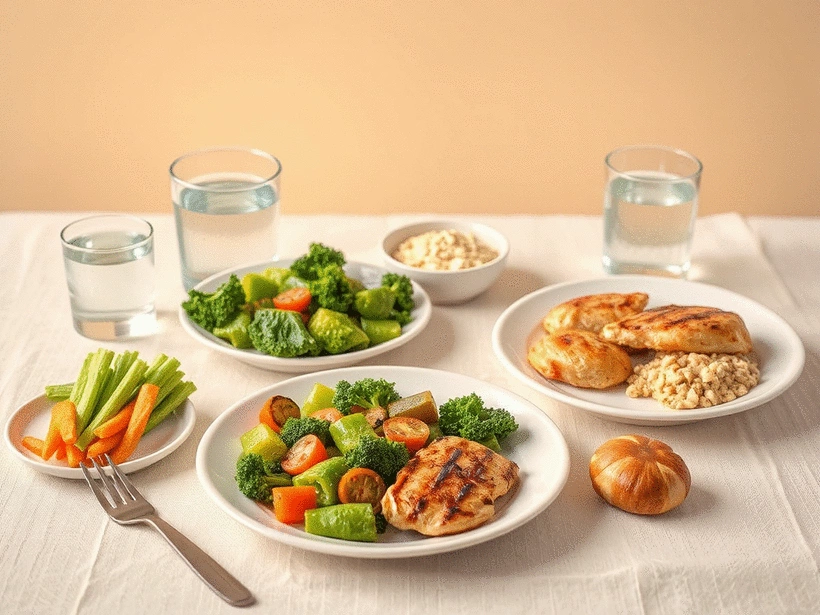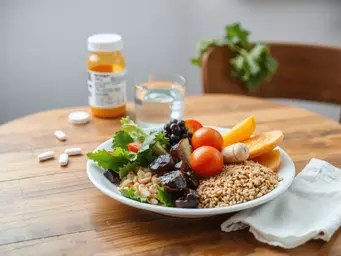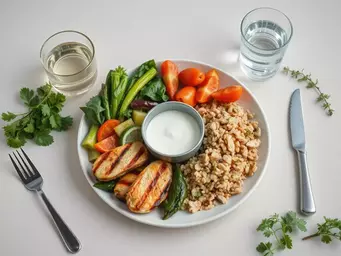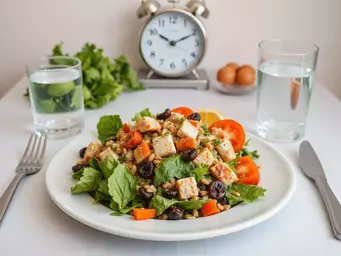GERD Diet Plan for Beginners

What if a few simple dietary changes could transform your digestive health? For those managing GERD, understanding the impact of food choices is key to regaining control over symptoms and enhancing overall well-being.
What You Will Learn
- GERD symptoms can significantly affect daily life, making awareness of triggers essential.
- A balanced, GERD-friendly diet can alleviate symptoms through careful food selection.
- Incorporating foods like low-acid fruits, lean proteins, and whole grains is beneficial for managing GERD.
- Staying informed about scientific research helps refine dietary choices and enhance GERD management strategies.
- It’s important to tailor your GERD diet if you have comorbidities like IBS or diabetes for effective symptom control.
- Setting realistic goals and tracking your food intake can aid in making lasting dietary changes.
- Consulting a registered dietitian provides personalized support and guidance for managing dietary choices related to GERD.
Key Aspects of a GERD-Friendly Diet
Managing GERD symptoms often involves dietary adjustments. The following visual outlines essential foods to incorporate and those to avoid for better digestive comfort.
Foods to Incorporate (GERD-Friendly)
- ✓ Low-acid fruits (e.g., bananas, melons)
- ✓ Lean proteins (e.g., chicken, fish)
- ✓ Whole grains (e.g., oatmeal, brown rice)
- ✓ Non-citrus vegetables
Foods to Avoid (Potential Triggers)
- ✖ High-fat and fried foods
- ✖ Citrus fruits & juices
- ✖ Caffeine & chocolate
- ✖ Spicy foods & peppermint
Symptoms of GERD (Common Indicators)
- ⚠ Frequent heartburn
- ⚠ Regurgitation of food/liquid
- ⚠ Difficulty swallowing
- ⚠ Chest pain
Management Strategies (Beyond Diet)
- ★ Elevate head of bed
- ★ Smaller, frequent meals
- ★ Track food intake & symptoms
- ★ Consult a dietitian
The Importance of a GERD Diet for Beginners
Starting a journey toward managing GERD can feel overwhelming, especially when it comes to dietary choices. The foods we eat play a crucial role in not only our digestive health but also in our overall well-being. As a gastroenterologist, I often emphasize the impact that diet can have on symptoms, making it essential to understand what a GERD-friendly diet can look like. For more detailed insights into nutritional management for GERD, you can refer to resources like the University of Michigan's GERD Nutrition Guidelines.
GERD, or gastroesophageal reflux disease, can significantly disrupt daily life. Many individuals find themselves avoiding social events or favorite meals due to fear of triggering uncomfortable symptoms. Recognizing the importance of a suitable diet can empower you to take control of your condition and lead to better digestive comfort.

Understanding GERD and Its Impact on Daily Life
For many, GERD is more than just occasional heartburn; it can be a persistent issue affecting daily activities. Symptoms like chest pain, regurgitation, and difficulty swallowing can hinder your ability to enjoy food and social gatherings. But don’t worry! You're not alone in this.
- Frequent heartburn
- Regurgitation of food or sour liquid
- Difficulty swallowing (dysphagia)
- Chest pain
Understanding these symptoms is the first step toward finding relief. By learning more about them, you can start to identify triggers and develop strategies to manage your symptoms effectively.
How Diet Plays a Role in Managing GERD Symptoms
Your diet can either exacerbate or alleviate GERD symptoms. Including the right foods can help calm your stomach and reduce discomfort. As we explore this topic, remember that everyone's body is different, so it might take some time to find what works best for you!
- Incorporating low-acid fruits, such as bananas and melons
- Choosing lean proteins, including chicken and fish
- Adding whole grains like oatmeal or brown rice
- Avoiding high-fat and fried foods
By focusing on a balanced, GERD-friendly diet, you can take significant steps toward managing your symptoms. Remember, small lifestyle adjustments can make a big difference in your quality of life!
Essential Foods for a GERD-Friendly Diet
Transitioning to a GERD-friendly diet doesn’t mean giving up on delicious food; it’s about making informed choices that support your digestive health. Together, we can explore some essential foods that can help you feel better while still enjoying meals.
Did You Know?
Research indicates that nearly 60% of individuals with GERD experience symptoms related to specific dietary choices. Making informed food selections can dramatically lessen the frequency and severity of symptoms!
Understanding the Broader Context of GERD Management
As we navigate the complexities of GERD management, it's essential to recognize the role that scientific research plays in shaping our dietary recommendations. Numerous studies have contributed to our understanding of how specific foods can influence symptoms and overall digestive health. Staying informed about these findings can empower you to make educated decisions about your diet and lifestyle. For example, a recent review highlighted in PMC NCBI discusses the therapeutic potential of diet in managing GERD.
Additionally, integrating scientific insights into your daily routine can enhance your ability to manage GERD effectively. For example, researchers have identified links between certain foods and symptom severity, leading to refined guidelines for a GERD-friendly diet.
The Role of Scientific Research in GERD Dietary Recommendations
- Understanding the link between diet and symptom triggers
- Refining food choices based on clinical studies
- Staying updated on emerging research for better management strategies
By harnessing the power of ongoing research, we can adapt our dietary choices to minimize discomfort and improve overall well-being. As a gastroenterologist, I frequently recommend that my patients keep an eye on the latest findings to better understand how their food choices impact their digestive health.

Addressing Comorbidities: Adapting the GERD Diet for IBS and Diabetes
Managing GERD can become more complex when other health issues, such as IBS (Irritable Bowel Syndrome) or diabetes, are present. It’s important to tailor your GERD diet to accommodate these conditions, as some foods beneficial for GERD may not be suitable for other digestive disorders.
- Choosing low-FODMAP foods for IBS management
- Monitoring carbohydrate intake to manage blood sugar levels in diabetes
- Finding balance with fiber-rich options that support both digestion and diabetes control
By working with healthcare professionals, you can devise a personalized approach that takes all your health concerns into account. This not only aids in symptom relief but also enhances your quality of life.
Next Steps for a Successful GERD Management Journey
Embarking on a journey to manage GERD effectively requires commitment and motivation. As you take these steps, remember that progress may be gradual, but each small change can lead to significant improvements in your well-being!
How to Stay Motivated and Make Lasting Changes
- Set realistic goals for dietary adjustments
- Track your food intake and symptoms to identify what works
- Celebrate small victories along the way
Staying motivated can sometimes feel challenging. However, creating a support network—whether through friends, family, or online communities—can make a difference. Sharing experiences and strategies with others who understand your journey can uplift and inspire you to keep moving forward.
Encouragement to Consult a Registered Dietitian for Personalized Support
If you find yourself feeling overwhelmed by dietary choices, don’t hesitate to seek help! Consulting with a registered dietitian can provide you with personalized guidance tailored to your specific needs. The Academy of Nutrition and Dietetics emphasizes that good nutrition is key to managing GERD effectively. They can help you navigate complex food relationships and modify your diet to optimize your health.
Long-Term Management Strategies for Sustaining a GERD Diet
- Regularly evaluate your diet and make adjustments as needed
- Incorporate stress management techniques to support overall digestive health
- Maintain open communication with your healthcare provider
Long-term success in managing GERD involves not only dietary changes but also lifestyle modifications. By adopting a holistic approach, you can create a sustainable path toward improved digestive health and overall wellness!
Recap of Key Points
Here is a quick recap of the important points discussed in the article:
- GERD can significantly impact daily life, making dietary choices crucial for managing symptoms.
- Incorporate low-acid fruits, lean proteins, and whole grains into your diet while avoiding high-fat and fried foods.
- Stay informed about scientific research that links specific foods to GERD symptoms to make educated dietary choices.
- Tailor your GERD diet if you have comorbidities like IBS or diabetes to accommodate your overall health.
- Set realistic goals for dietary changes, track your symptoms, and celebrate small victories to stay motivated.
- Consult a registered dietitian for personalized support in navigating dietary choices and optimizing health.
Frequently Asked Questions About GERD and Diet
- Q: What is GERD?
- A: GERD, or gastroesophageal reflux disease, is a chronic digestive disorder where stomach acid frequently flows back into the esophagus, causing irritation and symptoms like heartburn, regurgitation, and difficulty swallowing.
- Q: What foods should I generally avoid if I have GERD?
- A: It's generally recommended to avoid high-fat and fried foods, citrus fruits and juices, caffeine, chocolate, spicy foods, and peppermint as these can trigger GERD symptoms.
- Q: What foods are considered GERD-friendly?
- A: GERD-friendly foods include low-acid fruits (like bananas and melons), lean proteins (such as chicken and fish), whole grains (like oatmeal and brown rice), and non-citrus vegetables.
- Q: Can diet alone manage GERD, or do I need other strategies?
- A: While diet plays a crucial role in managing GERD symptoms, other strategies like elevating the head of your bed, eating smaller, more frequent meals, tracking food intake and symptoms, and consulting a dietitian are also important for comprehensive management.
- Q: How can I tailor my GERD diet if I also have IBS or diabetes?
- A: If you have comorbidities like IBS, consider incorporating low-FODMAP foods. For diabetes, focus on monitoring carbohydrate intake and balancing fiber-rich options. It's best to work with healthcare professionals, like a registered dietitian, to create a personalized plan.
- Q: Why is it important to consult a registered dietitian for GERD?
- A: A registered dietitian can provide personalized guidance tailored to your specific needs, help you navigate complex food relationships and modify your diet to optimize your health while considering any other health conditions you may have.








